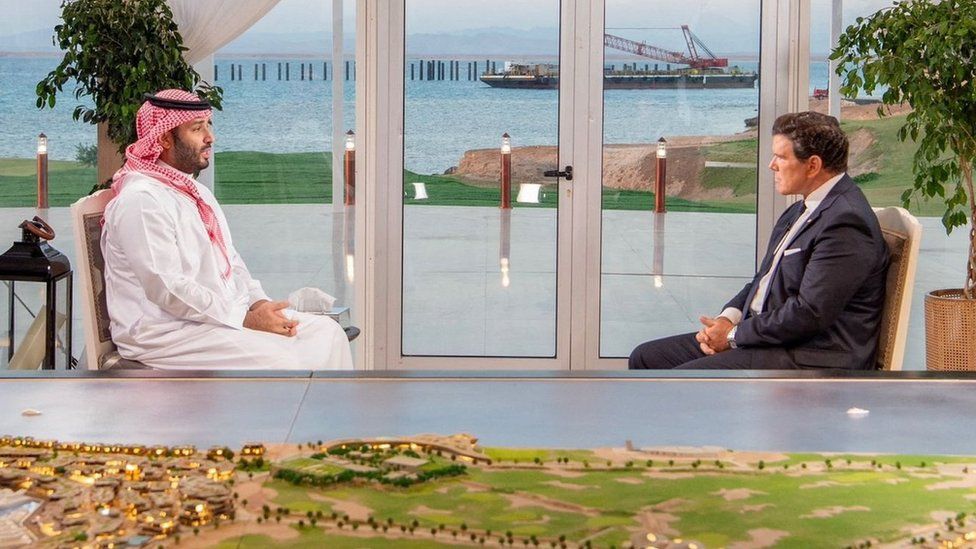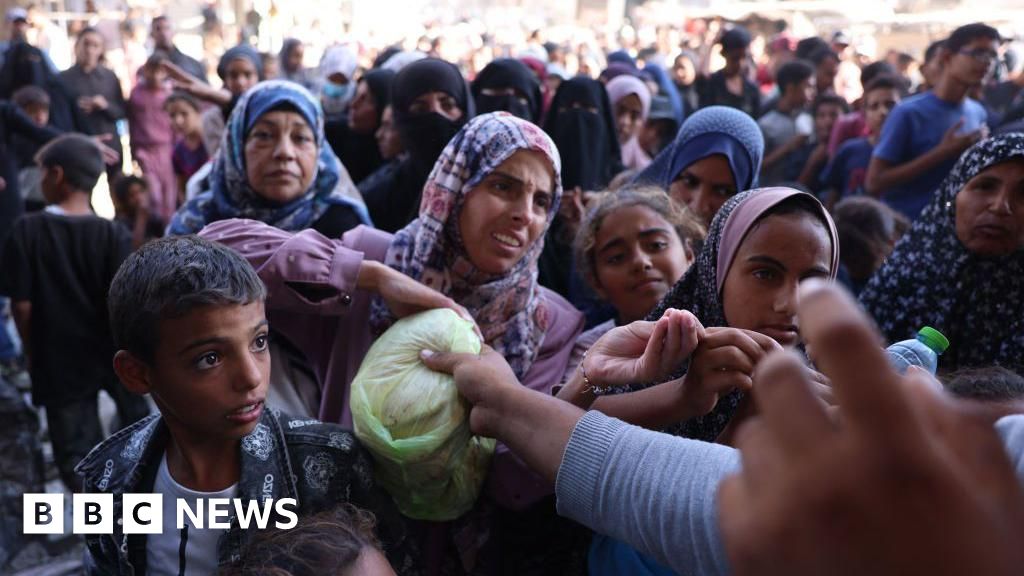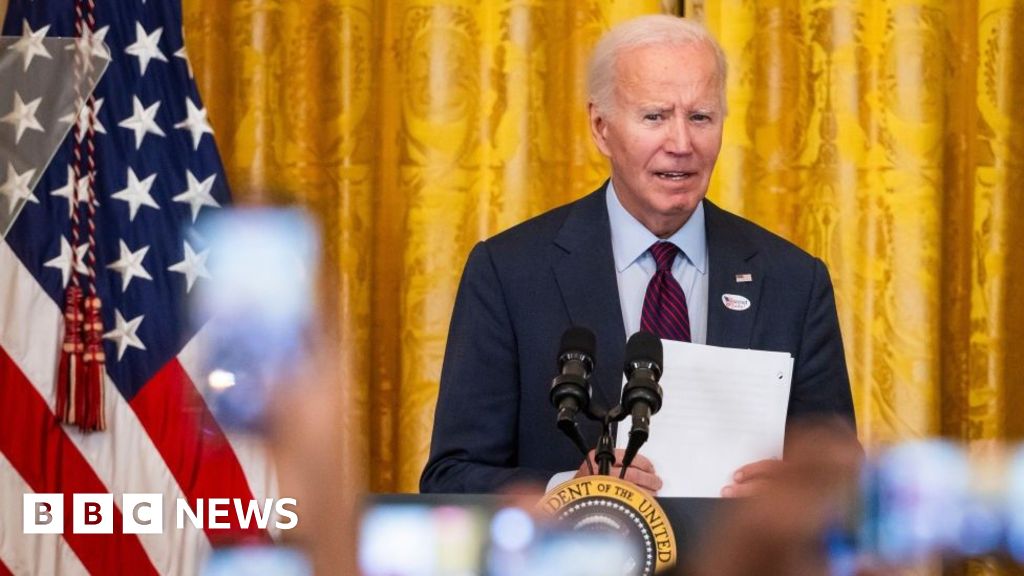ARTICLE AD BOX
 Image source, Reuters
Image source, Reuters
Saudi Crown Prince Mohammed bin Salman made the comments in an interview with Fox News
By Yolande Knell
BBC News, Jerusalem
Saudi Arabia's Crown Prince has said "every day we get closer" to normalising ties with Israel.
A deal between the two powers would mark a huge regional shift.
As part of the negotiation process, the Wall Street Journal said Israeli and US officials were working on a plan that could see Riyadh openly enrich uranium.
Enriched uranium can be used to make nuclear reactor fuel but also nuclear weapons.
The office of Israeli Prime Minister Benjamin Netanyahu - who has previously warned about the dangers of a Middle Eastern nuclear arms race - has not publicly responded to that article.
The Fox News interview aired shortly after Mr Netanyahu and US President Joe Biden met on the side-lines of the UN General Assembly in New York.
They also spoke positively about the chances of a breakthrough that would see Israel and Saudi Arabia establishing diplomatic relations for the first time. The US is a close ally of both countries.
An Israeli official statement said the meeting in New York "mostly dealt with ways to establish an historic peace agreement between Israel and Saudi Arabia, which could greatly advance an end to the Arab-Israeli conflict".
Israel's Foreign Minister, Eli Cohen, later said that a framework deal could be in place by early next year. "The gaps can be bridged," Mr Cohen told Israel's Army Radio. "It will take time. But there is progress."
The Biden administration hopes such a timeframe would enable it to clinch ratification in the US Congress - where many, particularly in the president's own Democratic Party, are critical of Saudi Arabia's human rights record. It would then have a significant foreign policy achievement to show ahead of November's US presidential election.
Like most Arab countries, Saudi Arabia has held off from recognising Israel out of solidarity with the Palestinians.
However, since late last year, the US has been trying to bring about a breakthrough that would build on the so-called Abraham Accords mediated by the Trump administration, which saw Israel sign bilateral agreements on normalisation with the United Arab Emirates and Bahrain in 2020.
In exchange for normalising ties with Israel, Saudi Arabia - which positions itself as a leader in the Middle East and the Islamic world - is asking for major military support from the US, co-operation in establishing its own civilian nuclear programme, and significant Israeli concessions to the Palestinians.
The latter would be extremely difficult to achieve under the most religious and nationalist government in Israel's history.
Image source, Reuters
Image caption,Israel's prime minister pledged to work towards normalisation with Saudi Arabia at a meeting with the US president
"For us, the Palestinian issue is very important. We need to solve that part," Crown Prince Mohammed, who is Saudi Arabia's de facto leader, told Fox News correspondent Bret Baier in English.
He commented: "We have a good negotiations strategy till now."
Earlier this month, leaders of the Palestinian Authority held talks with Saudi officials in Riyadh to lay out their demands for a possible deal involving the US, Saudi Arabia and Israel. The BBC learned that these included a cash boost of hundreds of millions of dollars and more control of land in the occupied West Bank.
Questioned during his interview about working with Mr Netanyahu's hard-line government, Prince Mohammed said: "If we have a breakthrough, reaching a deal that gives the Palestinians their needs and [making] the region calm, we've got to work with whoever's there."
Many members of Israel's current governing coalition are firmly opposed to the internationally backed idea of the two-state solution to end the Israel-Palestinian conflict. This would see an independent Palestinian state create alongside Israel in the West Bank and Gaza Strip, with its capital in East Jerusalem.
Ahead of the prime minister's talks in New York, 11 law-makers within his own right-wing Likud party said in a joint statement that they would block attempts to give land to the Palestinians in exchange for peace with Saudi Arabia.
The Wall Street Journal report has raised separate concerns for Israeli politicians.
"Normalisation that includes agreeing to turn Saudi Arabia into a nuclear power under the auspices of a ring-wing government is dangerous madness," Tali Gottlieb, a Likud member of parliament wrote on X, formerly known as Twitter.
The US newspaper said that Mr Netanyahu told senior nuclear and security experts in Israel to co-operate with American negotiators on a proposal for a "US-run uranium enrichment operation" in Saudi Arabia, quoting unnamed officials. They said that safeguards would be included and that the plan had yet to be signed off by President Biden.
Saudi nuclear plans did come up in the Fox News interview with Prince Mohammed.
Asked about the possibility of his kingdom's regional rival, Iran, eventually building a nuclear weapon, the Saudi leader said: "We are concerned of any country getting a nuclear weapon".
He reiterated a point that he has previously made, that if Iran were to obtain a nuclear bomb, Saudi Arabia would "have to get one, for security reasons, for balancing power."
The prince acknowledged that any country obtaining such a weapon was "a bad move", commenting: "Any country use a nuclear weapon that means they are having a war with the rest of the world."

 1 year ago
16
1 year ago
16








 English (US)
English (US)